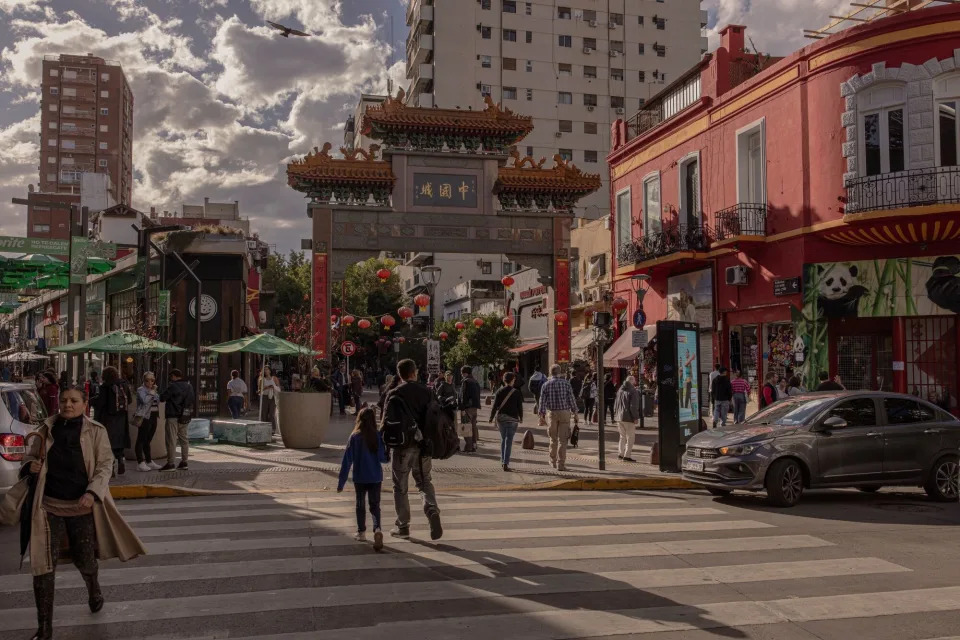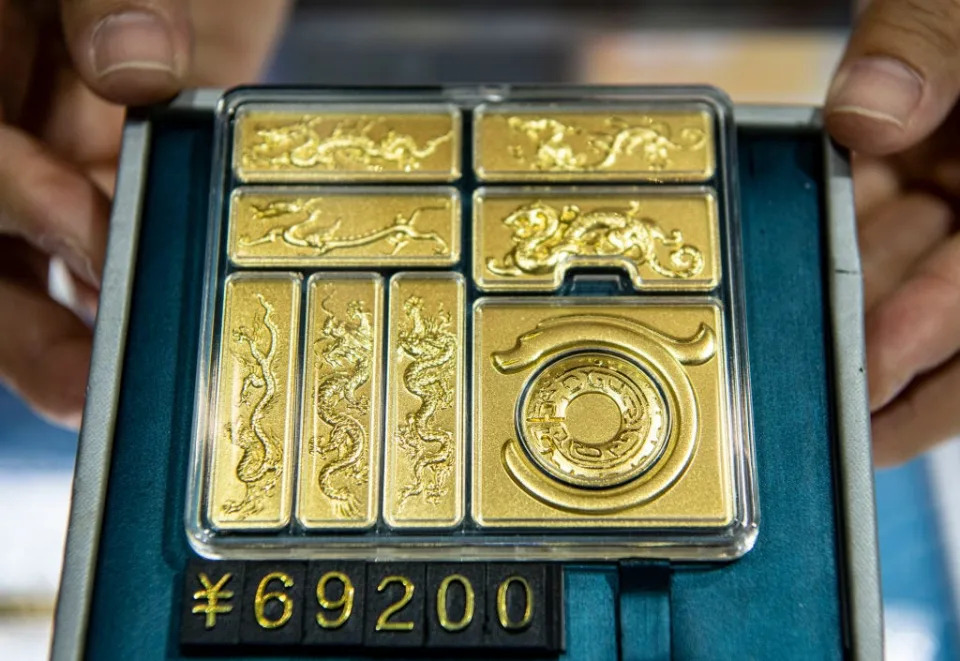
Jorgelina do Rosario, Eric Martin and Manuela Tobias
Tue, Jun 11, 2024
(Bloomberg) -- The International Monetary Fund expects China to reschedule payments on part of the $18 billion swap line that it has extended to Argentina, a key step that frees up cash amid President Javier Milei’s deep budget cuts and helps sustain the fund’s massive fiscal support program for the country.
Argentina owes the People’s Bank of China about $2.9 billion this month and $1.9 billion July, according to central bank data released last month.
An agreement between Argentine authorities and IMF staff last month on the latest review of the country’s program included a firm commitment to refinance or roll over the debt, which was drawn down from an existing $18 billion swap line between Beijing and Buenos Aires, according to people familiar with the deal, who asked not to be identified as the information isn’t public.
The rollover commitment clears a major obstacle for Argentina’s $43 billion IMF program, as the government must show it has so-called financing assurances to manage its enormous debt pile.
The details of the rollover or any refinancing weren’t immediately available. One of the people suggested Argentina could repay some of the debt while rolling over the majority of it.
The IMF declined to comment. Argentina’s central bank did not immediately respond to a request for comment on Tuesday. China’s embassy in Washington also did not immediately respond.
The Washington-based lender’s executive board is scheduled to vote on the agreement Thursday, Economy Minister Luis Caputo said Tuesday. The IMF will publish the staff-level agreement after vote.
Caputo said in April that Argentina is starting talks for a new IMF financing program that could involve fresh funds, adding that Milei’s monetary and foreign exchange plans are part of the discussion.
Former President Alberto Fernandez’s government last year used some of the money from China to pay off part of its loan from the IMF, something that no fund member has done in its 80-year history. It also used the Chinese funds to finance imports as it ran low on dollars.
China’s swap is the largest source of foreign gross reserves in Argentina’s central bank, whose debts are currently larger than its assets. It’s also the biggest yuan swap line in the world.
Gold is getting so expensive that even China's central bank stopped buying
Huileng Tan
Tue, Jun 11, 2024

Record gold prices are slowing appetite for the precious metal.
Tue, Jun 11, 2024
(Bloomberg) -- The International Monetary Fund expects China to reschedule payments on part of the $18 billion swap line that it has extended to Argentina, a key step that frees up cash amid President Javier Milei’s deep budget cuts and helps sustain the fund’s massive fiscal support program for the country.
Argentina owes the People’s Bank of China about $2.9 billion this month and $1.9 billion July, according to central bank data released last month.
An agreement between Argentine authorities and IMF staff last month on the latest review of the country’s program included a firm commitment to refinance or roll over the debt, which was drawn down from an existing $18 billion swap line between Beijing and Buenos Aires, according to people familiar with the deal, who asked not to be identified as the information isn’t public.
The rollover commitment clears a major obstacle for Argentina’s $43 billion IMF program, as the government must show it has so-called financing assurances to manage its enormous debt pile.
The details of the rollover or any refinancing weren’t immediately available. One of the people suggested Argentina could repay some of the debt while rolling over the majority of it.
The IMF declined to comment. Argentina’s central bank did not immediately respond to a request for comment on Tuesday. China’s embassy in Washington also did not immediately respond.
The Washington-based lender’s executive board is scheduled to vote on the agreement Thursday, Economy Minister Luis Caputo said Tuesday. The IMF will publish the staff-level agreement after vote.
Caputo said in April that Argentina is starting talks for a new IMF financing program that could involve fresh funds, adding that Milei’s monetary and foreign exchange plans are part of the discussion.
Former President Alberto Fernandez’s government last year used some of the money from China to pay off part of its loan from the IMF, something that no fund member has done in its 80-year history. It also used the Chinese funds to finance imports as it ran low on dollars.
China’s swap is the largest source of foreign gross reserves in Argentina’s central bank, whose debts are currently larger than its assets. It’s also the biggest yuan swap line in the world.
On the campaign trail last year, Milei raised questions about the future of Argentina’s relations with China if elected, calling the Chinese “assassins” and “communists.”
But in an April interview with Bloomberg News, the president adopted a much more pragmatic tone, avoiding incendiary remarks and assuring he wouldn’t touch the currency swaps.
©2024 Bloomberg L.P.
Gold is getting so expensive that even China's central bank stopped buying
Huileng Tan
Tue, Jun 11, 2024

Record gold prices are slowing appetite for the precious metal.
VCG/Getty Images
China's central bank has paused gold buying after prices reached record highs.
China's gold holdings were unchanged in May, halting an 18-month purchasing streak.
Gold prices are up 11% this year due to geopolitical tensions, but have softened from a record high.
China's central bank gold-buying streak has been a major driver of prices that hit record highs recently.
However, it looks like gold has gotten so expensive that even the People's Bank of China is taking a break.
On Friday, official data showed China's gold holdings were unchanged in May from the prior month — which means the central bank did not buy gold.
The PBOC's pause has left gold "vulnerable to more downside pressure," wrote Ewa Manthey, a commodities strategist at ING Bank, on Monday.
The benchmark spot gold price is around $2,300 per ounce — about 6% lower than its record high of nearly $2,450 per ounce on May 20.
Prices of gold, a traditional safe-haven asset, have been on a tear this year, gaining about 11% this year-to-date due to global geopolitical tensions. In China, people are also loading up on gold as a store of value amid economic uncertainties and a weak Chinese yuan.
But "gold's record-breaking rally might dent demand for now," wrote Manthey.
China's central bank gold buying had actually started to slow in April, when it bought just 60,000 troy ounces of the precious metal. That was down from 160,000 ounces in March and 390,000 ounces in February.
Before its pause in purchases last month, the PBOC had been snapping up gold for 18 straight months, making it the world's largest institutional buyer. According to industry association World Gold Council, China's central bank purchased 225 tons of gold in 2023. In second place was Poland's central bank, which bought 130 tons of the yellow metal.
David Tait, the council's CEO, told Reuters on Monday that China is "just waiting and watching. If prices correct to the $2,200 per ounce level, they will resume again."
Read the original article on Business Insider
China's central bank has paused gold buying after prices reached record highs.
China's gold holdings were unchanged in May, halting an 18-month purchasing streak.
Gold prices are up 11% this year due to geopolitical tensions, but have softened from a record high.
China's central bank gold-buying streak has been a major driver of prices that hit record highs recently.
However, it looks like gold has gotten so expensive that even the People's Bank of China is taking a break.
On Friday, official data showed China's gold holdings were unchanged in May from the prior month — which means the central bank did not buy gold.
The PBOC's pause has left gold "vulnerable to more downside pressure," wrote Ewa Manthey, a commodities strategist at ING Bank, on Monday.
The benchmark spot gold price is around $2,300 per ounce — about 6% lower than its record high of nearly $2,450 per ounce on May 20.
Prices of gold, a traditional safe-haven asset, have been on a tear this year, gaining about 11% this year-to-date due to global geopolitical tensions. In China, people are also loading up on gold as a store of value amid economic uncertainties and a weak Chinese yuan.
But "gold's record-breaking rally might dent demand for now," wrote Manthey.
China's central bank gold buying had actually started to slow in April, when it bought just 60,000 troy ounces of the precious metal. That was down from 160,000 ounces in March and 390,000 ounces in February.
Before its pause in purchases last month, the PBOC had been snapping up gold for 18 straight months, making it the world's largest institutional buyer. According to industry association World Gold Council, China's central bank purchased 225 tons of gold in 2023. In second place was Poland's central bank, which bought 130 tons of the yellow metal.
David Tait, the council's CEO, told Reuters on Monday that China is "just waiting and watching. If prices correct to the $2,200 per ounce level, they will resume again."
Read the original article on Business Insider
No comments:
Post a Comment